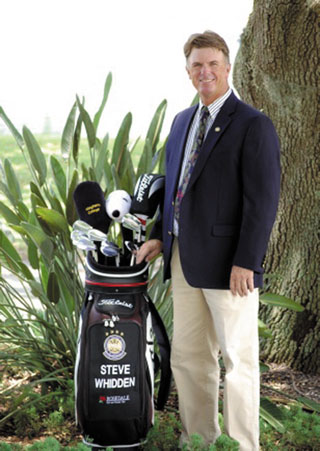|
Steve Whidden, PGA Master Professional
“MAKE
A NEW YEAR’S RESOLUTION PROMISE TO YOUR GOLF BALL”
This is the season
for better golf! This is a great resolution, but one that is
short lived if we do not approach learning the right way this
year.
I
want you to make a New Year’s Resolution to your golf ball
now and forever that you will not hit another shot until:
 You
understand what the club should be doing at impact You
understand what the club should be doing at impact
 You have the feel for what it
feels like to do it correctly You have the feel for what it
feels like to do it correctly
 And lastly, you have just performed
it perfectly in your practice swing. And lastly, you have just performed
it perfectly in your practice swing.
Let me tell you a story to give
you an example of how this works.
Not
too long ago, I had a student come to me for a lesson on his
wedges. He was having trouble with distance control and just
inconsistency with ball striking. After watching him hit a few
shots I asked him what he thought made the ball go in the air.
He said the loft and getting under the ball. I believe that it
is so important to know how the student thinks it works so that
I can dispel any motor thought or images that he or she might
have that are causing them harm. Don’t forget, golf is a
motor skill, which means you swing a club by an image you have
in your sub-conscious. Unfortunately, like this gentleman the
image was incorrect and that was part of the problem.
Next,
I asked him to take me through his whole routine. He stepped
behind the ball, lined it up, walked up next to the ball, and
took a practice swing that barley brushed the grass. Got up to
the ball, and the most beautiful thing happened. He topped it.
You may be thinking that this is not so beautiful, but let me
take you now on to your resolution.
The
first thing I did was explain to him how a club, in this case
the pitching wedge is made, with the shaft leaning towards the
target. This is due to the fact that we want the hands to lead
the club head in to impact and pass by the ball before the club
head hits the ball. I explained that in actuality, we do not
want to get under the ball, but instead that we want to hit the
ball first and then the ground with the divot in front of the
ball. This motion is what makes the ball climb up the club face
and puts the ball up. His image of getting under was causing
him to either hit it fat or thin.
Next,
I had him take some practice swings hitting in front of an imaginary
ball. This was brand new to his brain, but after a couple of
swings he got it. Next I explained that different clubs need
different depths of divots, for example a divot in front of the
ball with a wedge should be deeper than with a 6 iron since the
wedge is built more upright.
Now
we started his routine all over. We then made the Resolution
listed above to that ball right in front of him.
 He now has the knowledge of how
an iron is hit, where the divot needs to be and the size for
the chosen club He now has the knowledge of how
an iron is hit, where the divot needs to be and the size for
the chosen club
 He made a realistic practice swing
next to the ball and we waited for the divot in front of the
imaginary ball and the correct depth for the wedge He made a realistic practice swing
next to the ball and we waited for the divot in front of the
imaginary ball and the correct depth for the wedge
 Then, and only then, he was allowed
to come up to the ball, and from my suggestion, within no more
than 3 seconds pull the trigger, and evaluate if it was the same
motion. Then, and only then, he was allowed
to come up to the ball, and from my suggestion, within no more
than 3 seconds pull the trigger, and evaluate if it was the same
motion.
So
this year, learn what makes the ball do what it is supposed to
do at impact, rehearse it before you hit it, and keep that New
Year’s Resolution to your golf ball “I will not hit
you until I understand what to do, and have just rehearsed it
perfectly”
About Steve:
Steve Whidden, 2010 Southwest Florida PGA Teacher of the Year,
whiddengolf.com
Dir. of Instruction, The Steve Whidden Golf Academy, Rosedale
Golf & Country Club,
5100 87th Street East , Bradenton, Florida 34211,~(941) 756-0004,
swhidden@pga.com |